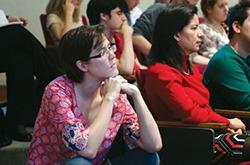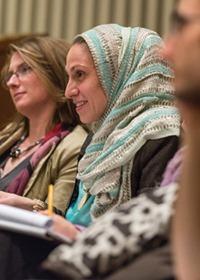
Building on its rich history of the past five decades, the Center for the Study of World Religions today seeks to extend its core mission into the twenty-first century.
Through its residential scholarly community, its outreach to faculty and students across Harvard University, its support of research, and its diverse array of events and programs, the CSWR aims to: deepen understanding of the world's religious traditions and communities; further scholarly understanding of the complex roles that religion plays in the world's cultures, economies, and political structures; explore creatively and constructively new models of interreligious encounter and active engagement that speak directly to the political, economic, and social challenges of the current century; and foster scholarly collaboration among the disciplines where religion is taken as a serious object of study, modeling new modes of productive interdisciplinary work, both at Harvard and beyond.
The CSWR sponsors a robust slate of programs each year in pursuit of these goals, from local, faculty- and student-led discussions to lectures and presentations open to the wider Harvard community and the general public. During the 2013–14 academic year, for example, the CSWR organized two lectures on comparative theology (one generously supported by a grant from the Luce Foundation), the annual Greeley Lecture for Peace and Social Justice, the annual Ahnkook Lecture in Korean Buddhism, and the annual Albert and Vera List Lecture in Jewish Studies.
The annual spring conference for 2014, "Studying Religion across the Disciplines," attempted to generate substantive discussion among scholars studying religion from diverse disciplinary perspectives in the humanities, social sciences, and biological sciences. Two "Religion in the News" sessions—ad hoc presentations intended to address the role of religion in unfolding events of global significance—were held in the fall: one on the turmoil in Egypt, the other on the rise of the fundamentalist Boko Haram in Nigeria (details can be found on the following page).
The CSWR currently sponsors various faculty-led colloquia, on topics ranging from the work of Michel Foucault to theories of translation and the comparative study of religion. CSWR residents selected as junior fellows for 2013–14 organized a series of lunches on the themes "Interfaith as Antidote: Models of Faith-Based Civic Engagement" and "Don't Know Much About: Students Teaching Students About the HDS Religious Landscape."
The CSWR actively seeks to promote the work of undergraduate and graduate students in religion in a variety of ways. One example of this, the Religion Colloquium that the CSWR hosts, brings together doctoral students and faculty to discuss the ways in which specific research in particular subfields can be brought into wider conversations in the study of religion more broadly. The Center also offers a field education placement each year for a student enrolled in the master of divinity program; the student selected organizes interfaith programming for students at all levels.
Each year the CSWR also selects one or two students for the Greeley International Internship to pursue peace and social justice work abroad during the summer. And, the Center awards one undergraduate summer research grant to support a Harvard College student's senior honors thesis work in religion.
Today, the CSWR's residential community continues to embody the religious and disciplinary diversity that the Center's founders first envisioned. Among the current residents are master's students, doctoral students, and visiting faculty who hail from the United States, Europe, and Asia, and represent Christian, Jain, Hindu, Buddhist, and Muslim communities and traditions (read profiles of five residents in the following pages).
Residents meet weekly for the CSWR World Religions Café to present their academic work-in-progress, and multiple informal community events take place throughout the year, from monthly breakfasts to the celebration of holidays and potluck dinners. In addition, in 2013–14, the CSWR hosted four visiting scholars, from Nigeria, Brazil, Japan, and Pakistan.
Looking to the future, the Center for the Study of World Religions seeks to become the primary site at Harvard University for the interdisciplinary study of the world's religious traditions and a major national and international leader in the understanding of religion as a ubiquitous feature of human life from diverse methodological perspectives.
Religion in the News

In the midst of the Center's busy schedule of events and programs, room is always found to host discussions on the role of religion in emerging headline news. Such "Religion in the News" programs—usually hosted by local faculty with relevant expertise—seek to educate the audience about the complex ways in which religious concerns operate in the broader socioeconomic and political contexts of today's world. Recent topics have included "Muslim Rage," "Timbuktu and Its Sacred Documents," and "The Pope Resigns."
During the fall 2013 term, Ahmed Ragab, Richard T. Watson Assistant Professor of Science and Religion at HDS and a native of Egypt who spent the summer in Cairo, hosted an informative and engaging conversation about recent events in Egypt, focusing in particular on the political position of the Muslim Brotherhood vis-à-vis the military and the legacies of the Mubarak regime.
Ousmane Oumar Kane, Prince Alwaleed Bin Talal Professor of Contemporary Islamic Religion and Society at HDS and Professor of Near Eastern Languages and Civilizations in the Faculty of Arts and Sciences, hosted a fascinating discussion on the formation of the fundamentalist group known as Boko Haram, whose meteoric rise to power in northern Nigeria has resulted in widespread violence.
